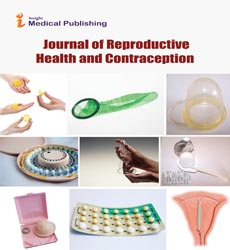Abstract
Temporary Contraceptives by Rural Young Women
Background: Globally low, inconsistent use of contraceptives by young people contribute to many unintended pregnancies but providing quality contraceptives, to sexually active young people continues to be global concern, of India too. Objective: Present study was undertaken to know use of temporary contraceptives by rural young women in Western Maharashtra. Materials and methods: Study subjects were asked about use of temporary contraceptives for prevention of first pregnancy, spacing between two pregnancies and limitation of pregnancies. Interviews were done with help of predesigned questionnaire in local language. Consent was taken. Results: It was revealed that reported contraceptive use was 78.8%. There were more than 21% young women who did not want baby, were at risk of unintended pregnancy but were not using contraceptives. Condom and Oral contraceptive pills were used infrequently. Very few (13%) women used intra uterine device, with more chances of continuity. No teenager used IUD. In 283 women under 20 years of age, 39.92% used contraception before first pregnancy, 32.86% did not use any contraceptive between 20-24 years, of 272 women, 37.13% used contraceptivebefore first pregnancy 16.54% did not use any. Overall 39.92% of 283 teen agers’ husbands used condom and 7.20% used OCP infrequently. Of 262 women of 20-24 years, 35.68% husbands used condom, 27.48% used OCPS infrequently. Between 25-29 years of 284 women, 43.66% husbands used condom, 21.37% OCPS infrequently. Significantly more teenagers did not use any contraceptive. More urban couples used condom compared to rural, but there was no significant difference. Illiterate women did not use any contraceptive, no post graduate studied had intra uterine device, with no difference in secondary school or under graduate studied rural, urban. However most women had high secondary school education (84.8%). Conclusion: Many young couples at risk of pregnancy did not use any contraceptive. There was not much of difference between rural urban. Though illiterate did not use any contraception, very few primary schools had used IUD, nor their husbands used condom. There was no difference in use of contraceptives in high secondary school or graduate educated women.
Author(s):
Chhabra S
Abstract | Full-Text | PDF
Share this

Google scholar citation report
Citations : 201
Journal of Reproductive Health and Contraception received 201 citations as per google scholar report
Journal of Reproductive Health and Contraception peer review process verified at publons
Abstracted/Indexed in
- Google Scholar
- China National Knowledge Infrastructure (CNKI)
- WorldCat
- Publons
Open Access Journals
- Aquaculture & Veterinary Science
- Chemistry & Chemical Sciences
- Clinical Sciences
- Engineering
- General Science
- Genetics & Molecular Biology
- Health Care & Nursing
- Immunology & Microbiology
- Materials Science
- Mathematics & Physics
- Medical Sciences
- Neurology & Psychiatry
- Oncology & Cancer Science
- Pharmaceutical Sciences


